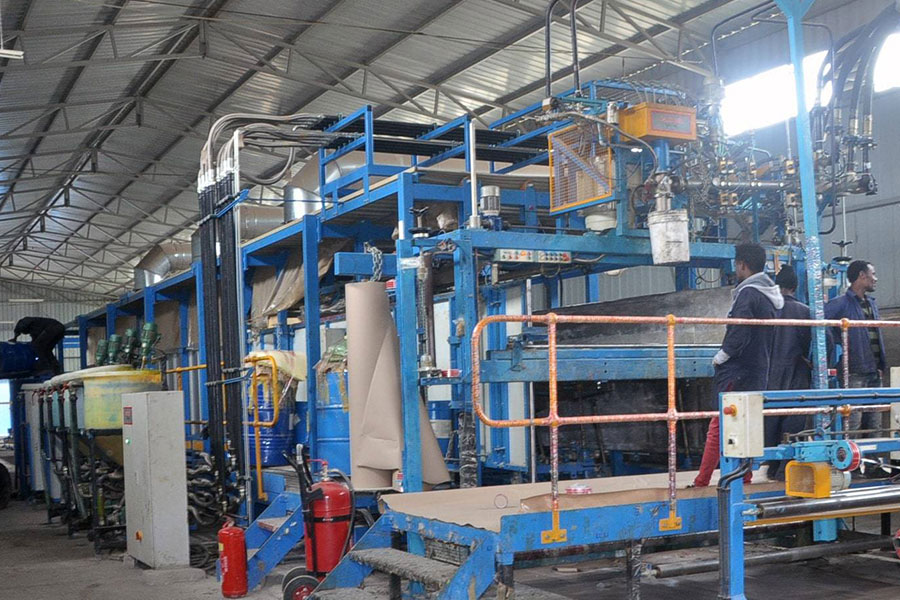
Fortune News | Mar 27,2021
Federal authorities are banking on a new wave of contractors to meet the country's infrastructure needs. However, the plan has its sceptics, considering that the sector faces significant challenges, including inflation, a lack of short-term credit options, and an unreliable labour market.
The authorities intend to train and graduate tens of thousands of contractors in three years under a new initiative to boost the construction industry. Under the Ministry of Urban Development & Construction, a program for capacity building of the construction industry is underway, with support from the Ethiopian Construction Works Corporation.
Mesfin Tadesse, a project manager for a team of up to a dozen people under CONSOL, conducted surveys across multiple regional states to identify gaps in the sector. He considers that 40,000 contractors are a small number given the country's demand for professionals in the industry.
Nearly 13,760 medium and small enterprises will be upgraded to contractors, while 18,240 new ones will be created, working with higher learning institutions and mobilising technical and vocational education and training (TVET) graduates in three years. The authorities plan to set aside a revolving fund of 24 billion Br they hope will address the capital issues that may arise during the project's implementation. The project is a remake of a previous attempt by the former Ministry of Construction which had a budget of 122.7 billion Br that failed to materialise.
The federal government aims to build 2.4 million homes by 2025, with each unit projected to cost an average of half a million Birr. The document availed late January proposes the creation of a construction development office under a board comprised of higher officials from the finance, revenues, and ministries in the urban and infrastructure sectors to steer it with a little over 61 million Br budgeted.
However, experts have differing views on the feasibility of the latest project. Project delays and underfunding have already hampered the country's public sector. The government's plan to train thousands of contractors may be ambitious, but its success will depend on overcoming the sector's current challenges.
Kalewold Fantaye, a grade four contractor with 25 years in the business, is sceptical, recalling a similar endeavour 15 years ago by the then Urban Development Bureau. It had upgraded about 3,000 contractors from enterprises, many of whom have since gone bankrupt or served extended periods in correctional facilities. He argued that if so many fail as contractors, it must indicate a systemic glitch, not individual ineptitude.
However, Tesfaye Hailu, a lecturer at the Ethiopian Institute of Architecture Building Construction & City Development (EIABC), applauded the move to upgrade enterprises to contractor status while suggesting careful calibration of contributing factors in the construction sector. He attributed the failure of prior attempts to the unwillingness of the enterprises as they would lose benefits such as tax exemptions, subsidies and micro-credits.
"It's a tall order," he noted, pointing out that the shortage of working capital will continue to trouble new contractors.
Tesfaye urged banks to redefine their relationships with contractors.
Etsub Dinku, a senior expert at the institute's research directorate with over a decade of experience, stressed the importance of practical experience and continuous education in building capacity and improving the sector. He believes a culture of sub-contracting and expanding field experience is essential to building a qualified workforce.
Despite the optimistic assumptions of both Tadesse and Etsub, the construction sub-sector saw its least growth rate in the last five years standing at 4.9pc, and the central bank data shows year-on-year headline inflation for January this year at 33.8pc. The negative real interest rates for lending and deposit remained at 19.79pc and 26pc, respectively.
According to Mesfin Tadesse, the project manager at CONSOL, shunned the impact of inflation on the project.
"You don't stop farming because a drought is on the horizon," he told Fortune.
Challenges faced by local contractors, such as delayed payments from clients, lack of short-term credit options, and unreliability of labour, are the main impediments to the development of the sector, according to a document outlining the problems.
Teferi Seyoum, who has been working in the construction sector for nearly 15 years, views the goal of infusing new contractors in the current inflation of the economy as a rather unrealistic prospect. He has a grade three construction license and is expected to have a yearly turnover of 140 million Br. Seyoum believes that obtaining bank loans has become increasingly difficult, even against collaterals, compounded by the declining number of clients willing to pay advances due to the liquidity squeeze.
"The construction sector is frozen," he told Fortune. "We are barely keeping up with payments."
Seyoum suggests that a culture of sub-contracting, continued refreshment courses, and expanding field experience is essential in building capacity.
"All of the education in universities is theoretical," he told Fortune.
A lecturer with over a decade of experience emphasises that qualification means more than just a degree.
Ethiopia's construction industry, which has seen significant growth in recent years, faces several challenges that threaten to hinder its progress. According to a report by the central bank, the sector's growth rate has shrunk to 4.9pc, the lowest in the past five years. This, coupled with galloping inflation, delayed client payments, and a lack of short-term credit options, has made it increasingly difficult for contractors to operate in the industry.
PUBLISHED ON
Feb 25,2023 [ VOL
23 , NO
1191]

Fortune News | Mar 27,2021

Verbatim | Sep 18,2021

Sunday with Eden | Feb 12,2022

Fortune News | Jan 27,2024

My Opinion | Feb 17,2024

Fortune News | Aug 31,2019

Fortune News | Oct 07,2023

Viewpoints | Aug 16,2020

Fortune News | Oct 30,2022

Commentaries | Jul 09,2022

Feb 24 , 2024 . By MUNIR SHEMSU
Abel Yeshitila, a real estate developer with a 12-year track record, finds himself unable to sell homes in his latest venture. Despite slash...

Feb 10 , 2024 . By MUNIR SHEMSU
In his last week's address to Parliament, Prime Minister Abiy Ahmed (PhD) painted a picture of an economy...

Jan 7 , 2024
In the realm of international finance and diplomacy, few cities hold the distinction that Addis Abeba doe...

Sep 30 , 2023 . By AKSAH ITALO
On a chilly morning outside Ke'Geberew Market, Yeshi Chane, a 35-year-old mother cradling her seven-month-old baby, stands amidst the throng...

Apr 20 , 2024
In a departure from its traditionally opaque practices, the National Bank of Ethiopia...

Apr 13 , 2024
In the hushed corridors of the legislative house on Lorenzo Te'azaz Road (Arat Kilo)...

Apr 6 , 2024
In a rather unsettling turn of events, the state-owned Commercial Bank of Ethiopia (C...

Mar 30 , 2024
Ethiopian authorities find themselves at a crossroads in the shadow of a global econo...